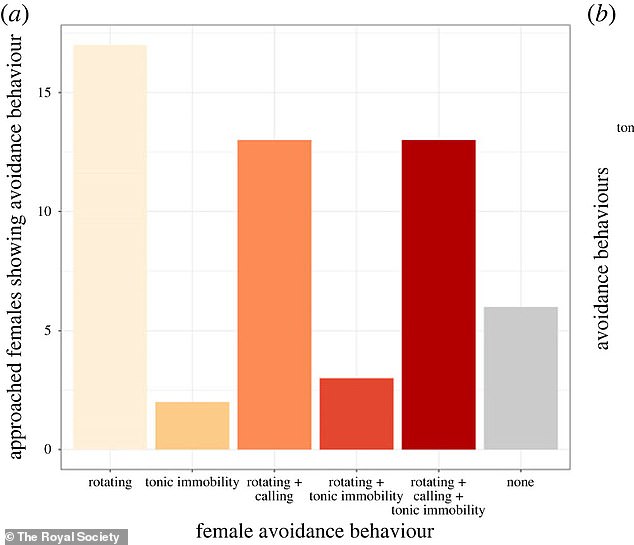Talk about croaking it! Female frogs fake their own DEATHS to get out of sex, study finds
>
From extreme fatigue to headaches, women have been known to use a range of excuses to avoid sex.
Now, a study has shown that female frogs use more extreme tactics when they’re not in the mood.
Researchers from the Leibniz Institute for Evolution and Biodiversity Science found that female European common frogs will roll over and grunt when approached by an unwanted mate.
Meanwhile, a third of females will fake their death to avoid males they don’t like.
While previous studies suggested that female frogs were somewhat passive, the results suggest that they play a more active role in mate choice.

Researchers from the Leibniz Institute for Evolution and Biodiversity Science found that female European common frogs will roll over and grunt when approaching an unwanted mate.
Common frogs are explosive frogs, meaning their breeding season is very short, between a few days and a couple of weeks.
Speaking to MailOnline, Dr Caroline Dietrich, lead author of the study, explained: ‘Hundreds of individuals congregate in the pond at this time. Males fight for access to females, which are usually the rare sex in these breeding groups.
“Males do not appear to be very selective, at least in terms of female body size, and will randomly abduct other individuals, even males or other species.
“This behavior leads to the formation of so-called mating balls, where several males can cling to one female, which can lead to the death of the female.”
In the study, the team set out to understand how females avoid being crushed to death or drowned by swarming males.
While observing 54 frogs in water-filled tanks, the researchers found that 83% of the females rolled onto their backs when grabbed by the males.
This may be to force the male to dive underwater, threatening to drown him if he is not released, according to scientists.
Meanwhile, 48% of them let out grunts that mimic the “release calls” that male frogs make to ward off other males.
Dr. Dietrich believes that the frogs’ feigning death may be linked to the stress levels experienced by young females.
Tonic imitation, the scientific term for feigning death, was more common among smaller and younger females, while older and larger frogs were more likely to use imitation calls.
“Female European common frogs can only increase their reproductive fitness by engaging in mating over several breeding seasons, so the selective pressure to survive the breeding season may be stronger,” Dr Dietrich said.

While observing 54 frogs in water-filled tanks, the researchers found that 83% of the females rolled onto their backs when grabbed by males.
“We believe that these mate avoidance strategies are due to a stress response that females experience during this time.
“Younger females may be less experienced, and strong stimulation of males clinging to them may result in the tonic immobility we often observed in smaller females.”
The research also suggests that females may choose the strongest males to mate with, with a rolling strategy used to test males’ strength and endurance.
Mating with a stronger male may also improve the female’s chances of survival as the stronger male can drive away other competitors and prevent the mating ball from being crushed.
In many species, feigning death can be a predator avoidance strategy where the animal feigns death to remain completely still when threatened.
However, feigning death as a strategy to avoid mating is very rare and has only been observed in a few animals such as some spiders and dragonflies.
In 2017, ecologist Rasem Khalifa observed that female dragonflies that had already laid eggs would crash to the ground and feign death if approached by a male.
Of the 35 dragonflies observed by Mr. Khalifa, 27 fell to the ground when chased by a man, and 21 of them successfully escaped.
On the other hand, among the gift-giving spiders Pisaura mirabilis, it is the males that feign their death during sex.
Female gift-giving spiders often devour their mates, so when threatened the male will sometimes “drop dead”, only cautiously coming back to life when he is no longer in danger of being consumed.
(tags for translation) Daily Mail
